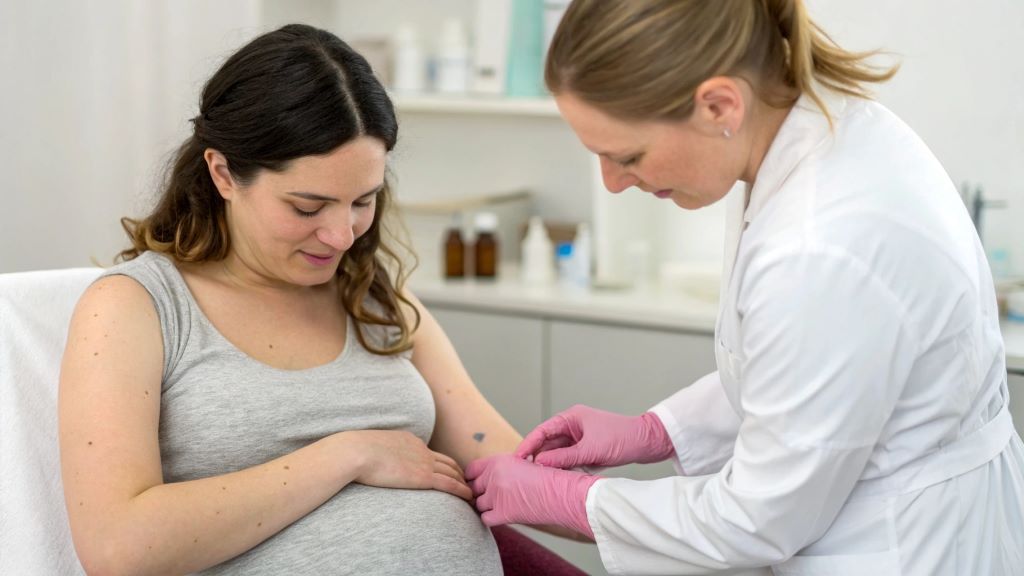Pregnancy is an exciting and life-changing experience, but it also brings about several physical changes. Among these changes, many women notice skin-related issues such as warts. Warts are common benign skin growths caused by the human papillomavirus (HPV). While they are generally harmless, they can be unsightly and bothersome, especially during pregnancy when your body is undergoing various hormonal shifts. If you’re pregnant and dealing with warts, you might be wondering about safe ways to get rid of them. Wart removal while pregnant requires careful consideration, as not all treatments are safe for both you and your baby. It’s important to consult with your healthcare provider to explore appropriate options that won’t pose any risks during this special time.
In this guide, we’ll walk you through everything you need to know about warts during pregnancy, including their causes, safety concerns, treatment options, and some helpful tips. Whether you’re trying to get rid of warts during pregnancy or just looking for more information on how to handle them, we provide the guidance you need.
If you’re looking for more guidance on how to get rid of warts during pregnancy, visit Ledmain.com for expert advice and resources.
What Causes Warts During Pregnancy?
Warts during pregnancy are caused by the same virus that causes warts in non-pregnant individuals – the human papillomavirus (HPV). During pregnancy, your immune system undergoes changes that can make you more susceptible to viral infections. As a result, you might notice more frequent or larger warts. Additionally, pregnancy hormones, especially increased levels of estrogen, can contribute to the growth of warts. These hormonal shifts can also affect your skin, making it more sensitive and prone to developing new warts.
In most cases, warts during pregnancy are harmless. However, they sometimes cause discomfort, especially when they appear in areas that experience constant rubbing or irritation, such as the hands, feet, or around the genitals. This can be frustrating and may lead many pregnant women to seek wart removal options.
If you’re looking for a safe way to get rid of warts during pregnancy, it’s important to consider treatment options that are both effective and safe for you and your baby. You can explore more about safe wart removal options during pregnancy at this Link: https://ledmain.com/health/remove-warts-during-pregnancy/. The article offers an in-depth look at various treatment methods, including which ones are suitable during pregnancy and which ones should be avoided.
Is Wart Removal Safe During Pregnancy?
When you’re pregnant, it’s natural to be cautious about using any form of treatment, including for skin conditions like warts. Wart removal treatments can vary significantly in terms of safety and effectiveness, and some might not be safe for pregnant women. Therefore, it’s essential to understand the risks and choose the right treatment method carefully.
Here are a few common wart removal methods and their safety during pregnancy:
Over-the-Counter Wart Treatments
Many over-the-counter wart treatments, including salicylic acid and cryotherapy products, are commonly used to remove warts. However, it’s crucial to avoid salicylic acid products during pregnancy unless directed by your doctor. Salicylic acid is a beta-hydroxy acid, and while it is generally safe for external use in non-pregnant individuals, high concentrations or prolonged use may pose a risk to a developing baby.
Healthcare providers can use cryotherapy, which involves freezing the wart, during pregnancy. However, you should do it with careful guidance to ensure safety.
Prescription Medications
Your doctor may recommend you use prescription treatments, such as imiquimod (Aldara), which doctors commonly use for external genital warts. However, healthcare providers typically prescribe imiquimod during pregnancy only when the benefits outweigh the risks, and they advise using it with caution. Always consult your doctor before using any prescription wart treatments.
Natural Remedies
Many pregnant women opt for natural or home remedies, such as tea tree oil, apple cider vinegar, or garlic. These remedies can sometimes help treat warts, though their effectiveness may vary. Although most people generally consider them safer during pregnancy, you should still check with your healthcare provider before using any natural products on your skin.
Surgical Removal
Surgical removal of warts, which is typically performed by a dermatologist, is another option. This can include procedures like laser treatment or excision. However, doctors usually consider surgical methods a last resort due to the potential for scarring and the need for anesthesia. Perform these procedures only when absolutely necessary and under the supervision of a healthcare provider.
When Should You Seek Medical Advice?
While many warts are harmless and can be treated at home, there are situations in which you should seek medical advice, especially during pregnancy. If you notice any of the following, it’s important to consult with your doctor:
- Warts are rapidly growing or spreading.
- You experience significant pain, bleeding, or irritation from a wart.
- Warts are located in sensitive areas (such as the genital region).
- You have concerns about using wart treatments during pregnancy.
Your doctor will be able to assess your situation and recommend the safest and most effective treatment option for you.
What Are the Risks of Wart Removal During Pregnancy?

Although wart removal is generally safe during pregnancy, there are some potential risks. These risks vary depending on the method of treatment. For example:
- Chemical Treatments: Using some chemical wart treatments, such as those containing salicylic acid, can lead to absorption through the skin and may pose a risk to the developing fetus if used in high concentrations or over prolonged periods.
- Cryotherapy: While cryotherapy (freezing the wart) is generally considered safe, there is still some risk of skin irritation or injury. Additionally, this procedure should only be performed by a healthcare professional to minimize risks.
- Surgical Removal: Surgical removal of warts can carry additional risks, such as infection or scarring, especially if performed on sensitive skin. Anesthesia and other medications used during the procedure should also be carefully monitored by your doctor.
Therefore, before deciding to undergo any wart removal treatment during pregnancy, always consult with your healthcare provider to ensure it is safe for both you and your baby.
Identifying and Preventing Headset Wear: A Comprehensive Guide
Five Frequently Asked Questions About Wart Removal During Pregnancy
- Can I use over-the-counter wart removers during pregnancy? Some over-the-counter wart treatments are not safe during pregnancy, especially those containing salicylic acid. It’s important to consult with your healthcare provider before using any over-the-counter products.
- Are natural remedies safe for wart removal during pregnancy? Many people consider natural remedies, such as tea tree oil or apple cider vinegar, safe for use during pregnancy. However, it’s always best to check with your doctor before using any natural products.
- What is the best method to remove genital warts during pregnancy? Genital warts require careful consideration during pregnancy. Your doctor may recommend topical treatments like imiquimod or cryotherapy. However, any wart removal treatment should be guided by a healthcare provider to ensure safety.
- Can warts affect the pregnancy or baby? Warts themselves do not typically affect pregnancy or the baby. However, if you have genital warts, there may be concerns about transmission to the baby during childbirth. It’s important to discuss these concerns with your healthcare provider.
- What are the alternatives to removing warts during pregnancy? If you prefer not to remove your warts during pregnancy, you can wait until after childbirth. In many cases, warts will go away on their own or may not cause significant issues.
Conclusion
Warts during pregnancy are a common occurrence due to hormonal changes and an altered immune system. While they are typically harmless, they can be bothersome, and many pregnant women seek ways to get rid of them. It’s essential to choose a safe and effective treatment method, keeping in mind that some options, such as over-the-counter medications or surgical procedures, may pose risks during pregnancy. Always consult with your healthcare provider before trying any wart removal method to ensure the safety of both you and your baby.
Read More:













+ There are no comments
Add yours